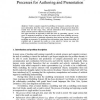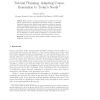116
click to vote
AIIA
2005
Springer
15 years 8 months ago
2005
Springer
Abstract. In order to have a robotic system able to effectively learn by imitation, and not merely reproduce the movements of a human teacher, the system should have the capabiliti...
111
Voted
AIED
2005
Springer
15 years 8 months ago
2005
Springer
We have developed a range of critical thinking environments for science education that span several academic content areas, including human biology, geology and forestry. All envir...
AIED
2005
Springer
15 years 8 months ago
2005
Springer
We briefly introduce the online learning environment INFACT, and then we describe its textual feedback system. The system automatically provides written comments to students as the...
118
Voted
AIED
2005
Springer
15 years 8 months ago
2005
Springer
Open learner models to facilitate reflection are becoming more common in adaptive learning environments. There are a variety of approaches to presenting the learner model to the st...
115
Voted
AIED
2005
Springer
15 years 8 months ago
2005
Springer
Today's computer supported modelling environments could provide much more information about the users’ actions and problem solving processes than they usually store for late...
103
click to vote
AIED
2005
Springer
15 years 8 months ago
2005
Springer
This research proposes a user modeling framework which aims to assess and model users’ creative problem-solving ability from their self-explained ideas for a specific scenario of...
110
Voted
AIED
2005
Springer
15 years 8 months ago
2005
Springer
This paper presents a scheme for the quantitative and qualitative assessment of concept maps in the context of a web-based adaptive concept map assessment tool, referred to as COMP...
101
click to vote
AIED
2005
Springer
15 years 8 months ago
2005
Springer
: In this paper we present two computational approaches that can be used characterize and measure online threaded discussions and demonstrate that they can objectively validate stu...
119
Voted
AIED
2005
Springer
15 years 8 months ago
2005
Springer
We describe extensions to a finite-state dialogue manager and its author scripting language that enable control over content repetition during tutorial dialogue. The problem of co...
AIED
2005
Springer
15 years 8 months ago
2005
Springer
Most of today’s course generation does not allow an in-depth, generic representation of pedagogical knowledge. However, supporting individual learners with different goals requi...



